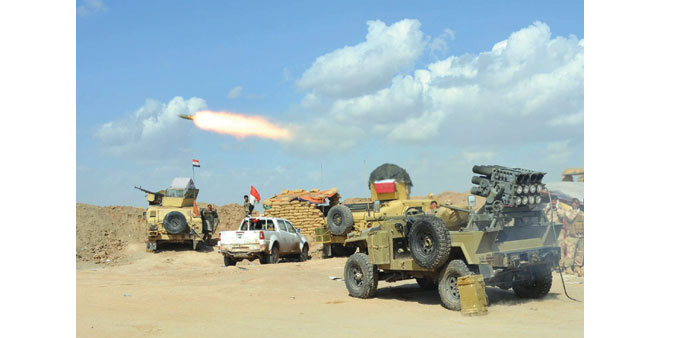Iraqi government forces and allied militias fire weaponry from a position in the northern part of Diyala province, bordering Salaheddin province, as they take part in an assault to retake the city of Tikrit from militants of the Islamic State (IS) group, on Monday.
Reuters
Baghdad
Thousands of Iraqi soldiers and Shia militiamen sought to seal off Islamic State fighters in Tikrit and nearby towns yesterday, the second day of Iraq’s biggest offensive yet against a stronghold of the militants.
Iranian military commander Qassem Soleimani, who has helped co-ordinate Baghdad’s counter-attacks against Islamic State since it seized much of northern Iraq in June, was overseeing at least part of the operation, witnesses said.
His presence on the frontline highlights Iran’s influence over the Shia fighters who have been key to containing the militants in Iraq.
In contrast, the US-led air coalition which has been attacking Islamic State across Iraq and Syria has not yet played a role in Tikrit, the Pentagon said on Monday, perhaps partly because of the high-level Iranian presence.
Iraqi military officials said security forces backed by the Shia militia known as Hashid Shaabi (Popular Mobilisation) were advancing gradually, their progress slowed by roadside bombs and snipers.
They have yet to enter Tikrit, the hometown of executed former president Saddam Hussain, or the nearby Tigris river town of al-Dour, which officials describe as a major centre for the Islamic State fighters.
On the southern flank of the offensive, army and police officials said government forces had surrounded and sealed off al-Dour, but had not yet launched an assault on the town, a source in military operations command said.
To the north, they captured a village close to Tikrit, the army said. Soleimani, head of the Iranian Revolutionary Guards Quds Force, was directing operations on the eastern flank from a village about 55km from Tikrit called Albu Rayash, captured from Islamic State two days ago.
With him were two Iraqi Shia paramilitary leaders: the leader of the Hashid Shaabi, Abu Mahdi al-Mohandis, and Hadi al-Amiri who leads the Badr Organisation, a powerful Shia militia.
“(Soleimani) was standing on top of a hill pointing with his hands towards the areas where Islamic State are still operating,” said a witness who was accompanying security forces near Albu Rayash.
Islamic State militants have staged several suicide bomb attacks against the army and militia in recent days. Twitter accounts linked to Islamic State supporters named one as Abu Daoud al-Amriki (American), suggesting he was a US citizen, saying he had d etonated a vehicle packed with explosives.
The offensive is the biggest in the Salahuddin region north of Baghdad since last summer, when Islamic State killed hundreds of Iraqi army soldiers who had abandoned their base at Camp Speicher outside Tikrit.
The Tikrit battle will have a major impact on plans to move further north and recapture Mosul, the largest city under Islamic State rule.
If the offensive stalls, it will complicate and delay a move on Mosul. A quick victory would give Baghdad momentum, but any retribution against local Sunnis would imperil efforts to win over Mosul’s mainly Sunni population.
Israelis must probe civilian
killings in Gaza war: envoy
Reuters
Geneva
A UN envoy called on Israel yesterday to investigate the killing of more than 1,500 Palestinian civilians, one third of them children, during the 2014 Gaza war, and to make the findings public.
Makarim Wibisono, a former Indonesian ambassador, issued his first report to the UN Human Rights Council since becoming its special rapporteur on human rights in the Palestinian territories last June.
US Secretary of State John Kerry accused the forum on Monday of being obsessed by allegations of Israeli abuses and said the US would defend Israel against efforts to isolate it.
Some 2,256 Palestinians were killed during the July-August conflict, of whom 1,563 were civilians including 538 children, while 66 Israeli soldiers and five civilians died, Wibisono said. Israel says it launched the offensive after rocket attacks by militants operating out of the Islamist Hamas-ruled strip.
“The stark disparity in casualty figures on the two sides ... reflects the (skewed) balance of power and the disproportionate cost borne by Palestinian civilians, raising questions as to whether Israel adhered to the international law principles of distinction, proportionality and precautions,” Wibisono said.
Most civilian victims were “not simply bystanders on the street in the wrong place at the wrong time”, he said. “Most victims were families killed in missile strikes on their own homes, usually at night.”
He interviewed victims in Amman and Cairo or witnesses on video calls in Gaza, as Israel had not let him go there. A separate report on possible war crimes committed by both sides is to be issued by a UN commission of inquiry soon. Its chairman was forced to step down last month.
Unexploded ordnance still litters Gaza, causing further casualties, he said, with an estimated 7,000 devices needing to be defused. Some 100,000 people remain displaced while 450,000 are disconnected from water mains.

